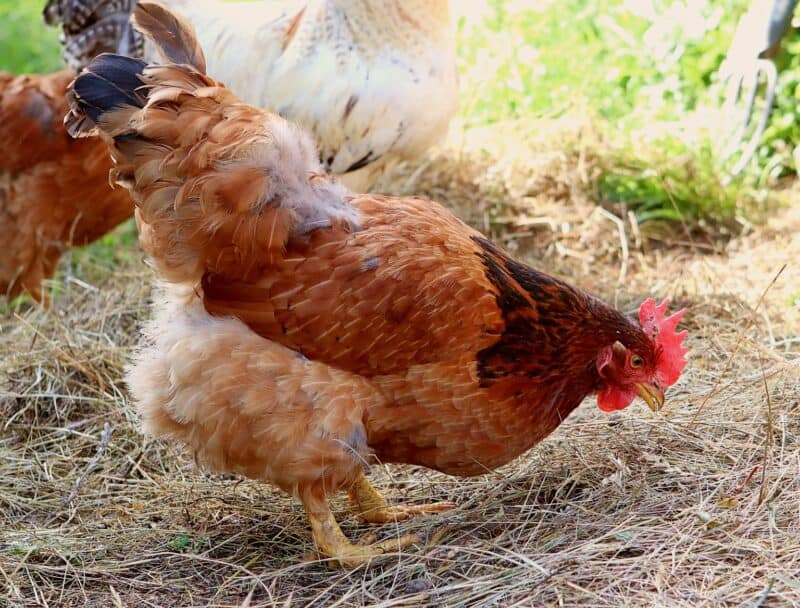Chickens eat all sorts of surprising things. These omnivorous yard birds will happily eat meat, insects, leaves, fruits, veggies, and even grass. Let it be said that a chicken will never run out of things to eat.

In fact, they are often seen swiping food and even bedding from other animals given the chance. How about straw? Can chickens eat straw?
Yes, chickens may eat straw since it contains a few seeds leftover from harvesting that chickens like to scratch for, and may even eat the stems themselves if they sprout or are soaked. Chickens also love to hunt for insects that might be hiding in the straw.
Looks like chickens will make a meal out of straw one way or another.
Though straw itself is minimally nutritious, it will give chickens some calories and foraging opportunities, aside from its typical use as bedding keep reading to learn everything you need to know about chickens eating straw.
Health Benefits of Straw for Chickens
Straw itself, except any seeds leftover in it, is minimally nutritious for chickens. However, it does offer some calories and fringe health benefits.
For one, straw is a good source of fiber. This may help chickens stay regular and aid in digestion.
Straw also provides a small amount of protein and calories. These will help chickens maintain their body weight and energy levels.
Another health benefit of straw is that it provides chickens with an opportunity to forage.
Foraging is an instinctive behavior for chickens, and they love to scratch and peck at anything that looks remotely edible.
Allowing them to forage in a pile of straw gives them a sense of satisfaction and helps to keep them mentally and physically stimulated.
Insects, as you probably know already, tend to take up residence in straw and will quickly become prey for your birds.
Can Chickens Eat Straw Raw?
Yes, but they are unlikely to. It is far more likely that chickens will scratch and pick out any seeds that might remain in the straw. These seeds are a valuable source of energy and nutrients for chickens.
But the stems of the straw itself are not particularly palatable to chickens, so they are unlikely to eat it raw unless they are very hungry.
If you do see your chicken eating straw, there is no cause for alarm unless they are eating lots of it; it is not poisonous or harmful to them in any way.
Chickens are More Likely to Eat Soaked or Sprouted Straw
If you soak straw in water or allow it to sprout, chickens will be more likely to eat it. Soaking straw makes it more palatable and easier to digest for chickens.
It also breaks down some of the fiber, making it easier for chickens to extract the nutrients from the straw.
Sprouted straw is somewhat more nutritious than raw straw, as the sprouting process breaks down some of the plant’s cell walls, making the nutrients more available to chickens.
Chickens are Likely to Eat the Insects Hiding in the Straw
One of the biggest food payoffs for chickens, concerning straw, is the insects that are invariably found in it.
Chickens love to eat bugs, and they are an important part of a chicken’s diet. Your birds will happily hunt through a pile of straw for their next snack!
This has the added benefit of helping to keep the straw turned, drier and cleaner; as chickens scratch through it looking for food, they will also spread it around and help to aerate it.
Caution: Don’t Allow Chickens to Eat Moldy Straw
Moldy straw should not be fed to chickens. While mold itself may or may not be poisonous, it can definitely cause respiratory problems in chickens.
If you find moldy straw, throw it out and replace it with fresh straw- don’t let them eat or forage in it.
Beware of Pesticides and Debris in Straw Bales
Another potential hazard of straw for chickens is the likely presence of debris and potential contaminants in any given bale.
Pesticides may have been used on the straw, which could be harmful to your chickens if ingested.
There is also the potential for sharp objects like nails, wire, or shards of glass to be hidden in the straw. Things like paper or plastic debris will also be found in low-quality bales.
Straw is cheap and is often harvested and bailed with practices and concerns that could be called middling, at best. Be sure to inspect it thoroughly before giving it to your birds in any capacity.
Preparing Straw for Your Flock
You don’t need to do much to prepare straw for your flock. If you are going to feed it to them, you may want to soak it or allow it to sprout first, as this will make it more palatable and easier for them to digest.
Other than that, just make sure that any moldy straw is removed, and that the bale is free of debris and contaminants. They’ll be picking and pecking at it soon enough.
Can Baby Chicks Have Straw, Too?
Yes, in the same manner as adults that are foraging for seeds or insects, and only when they are old enough.
It is suggested that you introduce them to small pieces of straw around the same time that you would offer them grit, at about 6 weeks old.
Make sure the straw is clean and free of contaminants, as baby chicks are more susceptible to illness than adult birds.
A small handful of straw per chick is all that is necessary for them to get a little food and fun out of it.
Tom has lived and worked on farms and homesteads from the Carolinas to Kentucky and beyond. He is passionate about helping people prepare for tough times by embracing lifestyles of self-sufficiency.
